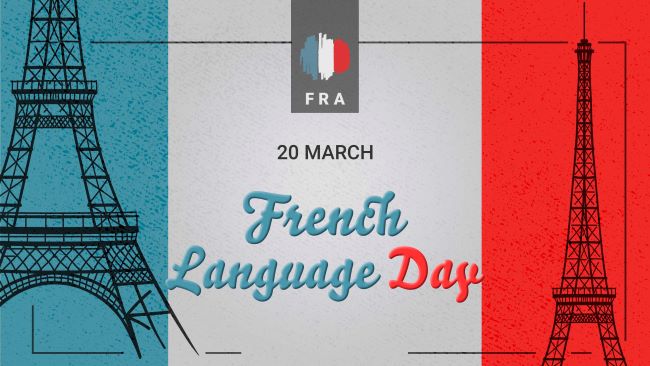
Fun Facts about French
French is a wonderful language. And learning is becoming increasingly popular.
Due to France's rich history and culture, the language also has a fascinating past.
This knowledge can enhance your appreciation of the language. Here are fourteen astounding facts about the French language.
The Romance language French is commonly regarded as one of the world's most beautiful languages.
A Romance language is a language whose root is Latin, which was historically spoken by the ancient Romans.
Even though French shares the Romance label with heavyweights such as Italian and Spanish, it is undoubtedly one of the most interesting Romance languages.
This article discusses seven major aspects of the French language that contribute to its uniqueness.
Interesting Facts about French
1. The French language is a Romance language.
The first of these French language facts is probably not all that shocking.
Since French is derived from Latin, it is classified as a Romance language.
Did you know that the Latin from which French is descended is distinct from conventional Latin?
It is referred to as Vulgar Latin. Vulgar Latin was primarily informal Latin, whereas intellectuals and academics study conventional Latin.
The origin of all Romance languages is Vulgar Latin.
With the establishment of the Académie française in 1634, the standardization of French began in the 17th century, and its structure has changed little since then.
During the 17th century, French became the lingua franca of Europe and spread throughout the world as France expanded its colonial empire, simultaneously affecting numerous other European languages.
During the 17th century, French became the lingua franca of Europe and spread throughout the world as France expanded its colonial empire, simultaneously affecting numerous other European languages.
2. About 220 million people speak French around the world.
80% of the French-speaking population are native speakers.
French is an official language in 29 nations, including France, Belgium, Canada, Luxembourg, Switzerland, Congo, Mali, and Senegal, and is spoken on all continents.
It is the fourth most often spoken mother tongue in the European Union.
The number of French speakers is projected to reach 700 million by 2050, the majority of whom will reside in Africa.
The number of French speakers is projected to reach 700 million by 2050, the majority of whom will reside in Africa.
3. French was not widely spoken in France
This is the most peculiar of these French linguistic facts.
Before the French Revolution, the French language was not widely spoken across France.
Before this time, there were regions in France where numerous dialects were spoken.
In fact, until the 19th century, German and Dutch spoke French more than any other language.
4. French includes a large number of homophones
Words that sound the same but are spelled differently and mean different things are called homophones.
This facilitates the creation of tongue twisters.
- Cinq chiens chassent six chats. – Five dogs hunt six cats.
- Les chaussettes de l'archiduchesse, sont-elles sèches? Archi-sèches. – The socks of the archduchess, are they dry? Very dry.
- As-tu vu le vert ver allant vers le verre en verre vert? - Did you observe the green worm approaching the green glass?
- Ces six saucissons-secs-ci sont si secs qu'on ne sait si s'en sont. – These six dried sausages are so dry that it is unclear whether they are edible.
5. Twenty-nine percent of English Vocabulary Is French
Indeed, English is a combination of different languages.
And while it bears many parallels with German, it is impossible to deny its French influence.
This resulted in the Norman Conquest of England in 1066. This invasion caused a prolonged fusion of the two languages.
Approximately 50,000 English words are currently derived from French.
In addition to the historical effect, there are a large number of contemporary French loanwords in English.
of French words and expressions being adopted into English. Throughout the centuries, the French remained a significant influence on contemporary English.
A few examples of these are
- "café,"
- "déjà vu,"
- "naïve
- "décor,"
- ," and
- "restaurant." etc.
6. French Culinary Terms are International
French cuisine is certainly well-known and popular. Their world-famous dishes are of the highest quality.
However, not just the cuisine is internationally renowned. French terminology has come to define the cooking process.
Chef, blanching, sautéing, and julienne are some of the French-derived cooking terminologies.
France is renowned for its great cuisine and wine exports, so it should come as no surprise that French words are usually associated with both: foie gras, brie, and sauvignon blanc.
However, French language influence extends beyond the restaurant and into the kitchen as well.
Self-taught chefs have mastered French culinary disciplines, including julienne, consommé, and mayonnaise.
The French language's reach, breadth, and appeal are unquestionable.
It is a language for poets and authors, and wine and cuisine enthusiasts.
It is a language spoken by world leaders in business, politics, and social justice, as well as by scholars, teachers, and students everywhere. Moreover, it is one of the most beautiful and melodious languages the world has ever witnessed.
7. French is significant language in the diplomatic community.
Numerous international institutions, many Diplomatic communication adopted French as one of their official languages they are mainly :
- the United Nations (UN),
- the European Union (EU),
- NATO
- the International Olympic Committee (IOC),
- the Red Cross, and
- Doctors Without Borders (DWB), etc.
Numerous international courts also recognize French as an official language.
The United Nations operates in six languages, including Arabic, Chinese, English, Russian, Spanish, and French.
However, French is also the working language of multiple international organizations.
It is one of three procedural languages of the European Union, along with German and English.
8. L'Académie Francaise Protects the Language
Since Cardinal Richelieu founded the Académie Francaise in 1634, it has worked to protect the literary integrity of the French language.
The academy is comprised of forty members that manage the language by introducing new words and considering ways to update it.
Except for English, several languages have similar types of academies.
The Academy has declared that the French language will undergo considerable changes in 2016.
They voted to remove the circumflex over "I" and "u," thus altering the spelling of numerous nouns.
They also voted to modify the spelling of certain nouns, such as "onion," from "oignon" to "ognon."
They feel that deleting some silent characters will make the language easier to learn.
9. The sixth most common language in the world is French.
French is one of the most widely spoken languages in the world, with about 80 million native speakers and over 274 million total speakers.
French is the sixth most spoken language in the world and an official language in 29 nations.
The Organisation Internationale de la Francophonie (OIF) is another organization that promotes the French language internationally (OIF).
A person who speaks French is known as a francophone.
Belgian and French colonialism contributed to the spread of French around the world, which contributed to its widespread use.
While around 40 percent of French speakers live in Europe, there are also large French-speaking communities in Africa, Canada, and several other nations.

10. French is becoming increasingly popular
Since the end of World War II, there have been three times as many French speakers.
Interestingly, as French-speaking countries in Africa continue to flourish and grow, the language's popularity continues to rise.
Current projections indicate that the global population of French speakers could reach over 750 million by 2050.
Given that there are currently 500,000 French professors training over 120 million students globally, this number is not too shocking.
11. French counting follows a different logic.
Every language has its own approach to counting, but the French method can sometimes be regarded as odd. There is no greater clarity than between the numbers 80 and 99. While "eighty-three" would be used in English, "quatre-vingt" or "four twenty" would be used in French. When you reach 99, things become really exciting. IYou would say "four-vingt-dix-neuf" or "ten, nine" instead of "ninety-nine."
This partial vigesimal system, or system of numbering by twenty, was developed as a means of unifying the counting system following the French Revolution. You can observe a similar relationship in the obsolete use of "scoring" in the English system.
12. False friends (are also plentiful:
Yes, many English words are French in origin. In addition, there are other French terms that sound like they should translate to a particular English word, but don't.
These phrases are termed "faux amis" (false friends).
Le bras (arm) is the false friend (Confusing word) who always makes me laugh. I cannot avoid thinking of a woman's bra.
In fact, in a conference where a French person was the keynote speaker.
He was bilingual (French and English), and it was International Conference so, his speech was delivered in English.
However, he made a mistake at a crucial moment. When he wished for people to raise their hands, he said into the microphone, "All right, ladies, raise your bras!"
it was epic moment for all persons, they didn't stop laughing when they come to know its French origin and meaning as well.
Other frequent false friends include :-
- la librairie (Bookstore not library),
- gentil (kind, not gentle), and
- actuel (current, not actual).
- This is only the beginning!
13. French Contains Numerous Homophones
These are the types of words that share a similar look and sound.
However, their meanings are quite different. These may appear difficult to learn, but they are enjoyable tongue twisters.
Here are some well-known French words with the same sound:
• Si mon tonton tond ton tonton, ton tonton sera tondu. - Your uncle will get a shave if my uncle shaves him. Your uncle will be shaved if my uncle shaves him.
• As-tu vu le vert ver allant vers le verre en verre vert ? Did you see the green worm heading towards the green glass?
• Cinq chiens chassent six chats. – Five dogs hunt six cats.
14. French-speaking famous celebrities
Bradley Cooper is a great actor (and singer), but did you know that he is also fluent in French?
Jodie Foster, Johnny Depp, Serena Williams, Joseph Gordon-Levitt, Tom Hiddleston, Shakira, Gwyneth Paltrow, and Emma Watson are also French-speaking celebrities.
15. French literary works.
French is a literary language. You are surely aware of Les Misérables, but did you realize that some of the most well-known fairy tales were initially written in French?
Consider La Belle et la Bête (Beauty and the Beast), Le Petit Chaperon Rouge, Le Chat Botté, Cendrillon, La Barbe bleue, and La Belle au bois dormant (The Sleeping Beauty).
16. French has no words beginning with "W"
If a French term has the letter "w," it is because it was borrowed from another language. WiFi, WC, and web design are all of English origin.
17. French media are popular.
France is home to some of the world's most popular films and literature.
A popular French cartoon is Astérix, which depicts the adventures of a tiny Gallic warrior.
It has sold millions of copies, been translated extensively, and adapted into at least thirteen feature films.
Le Petit Prince or the Little Prince by Antoine Saint Exupéry is the most translated non-religious novel in the world.
Its popularity has resulted in 300 translations. With almost 200 films produced each year, French cinema is second only to Hollywood.
The Cannes Film Festival, one of the most prominent film festivals, is held in France.
Learning French will improve your performance on standardized tests:
Prior to taking the SAT, ACT, or GRE, you might wish to brush up on your French.
Learning a foreign language, particularly one based on Latin, enhances linguistic awareness. Consequently, you have a greater chance of performing on standardized tests in reading, writing, and vocabulary areas.
18. French is easier to learn than you might believe
After reading the following information about the French language, you will undoubtedly desire to study it.
Due to the similarities between English and French, it is not difficult at all to master this language.
And if you want to acquire French proficiency in the quickest and most effective manner possible, OptiLingo makes the process even easier.
19. French has a great influence.
- Approximately one-third of basic English terms are derived from French, including view, challenge, pride, and conflict.
In addition, French has more than a million words, with 20,000 new ones being added annually.
The English language continues to adopt French words into its common use.
Words like déjà vu, cul-de-sac, and popular expressions like femme fatale or film noir.
20. French is also extensively spoken in the United States.
French is the fourth most commonly spoken language in the United States. After Spanish, the second most common language to learn.
New York, Florida, and California have joined Louisiana and New England as the most important French-speaking regions in the United States.
Fifty percent of International films viewed in the United States are in French, while thirty percent of foreign books are read in French.
More than 1.5 million Americans are native French speakers, and between 6 and 11 million speak French as a second language fluently.
21. French and Ballet go hand in hand.
• Because ballet was institutionalized in France, a substantial amount of ballet terminology is French.
The French terms rond de jambe, plié, and enjambé all describe classical ballet positions.
22. Official Language status in 29 countries
French is second only to English in terms of the number of nations in which it is an official language.
In contrast to English, which is an official language in 67 countries, French is an official language in 29 nations.
French is the official language of France, Belgium, Canada, Luxembourg, Switzerland, Congo, Mali, and Senegal, among others.



